The ultimate conquest of control and customization is the Linux operating system which is popular among developers, privacy advocates and power users across the globe. Although it is open-source and hence transparent, it has distinct requirements on VPN services. In contrast to Windows or Linux, in which proprietary graphical applications are the standard, a Linux VPN should fit perfectly into the various distributions (such as Ubuntu, Debian, and Arch) and should accommodate the users preferred usage of Command Line Interface (CLI) or a fully-formed Graphical User Interface (GUI).
Linux users have been using manual installation or command-line utilities over the years. The finest VPNs have eventually become caught up in 2025 and provide customised applications, utilizing the speed of the open-source WireGuard protocol but offer the necessary features that Linux customers need: audit-verified safety, network management, and additional features such as an operating Kill Switch.
This guide includes a detailed overview of the 15 most popular VPN for Linux services that perform well in the Linux ecosystem, and evaluates their own customers, the protocols they support, as well as their adherence to the openness of the open-source environment.
Linux VPN Performance: Outlined Information
- Available in GUI: The trend has changed radically. Some leading providers, such as NordVPN, Surfshark and Proton VPN, now provide fully-fledged, native Graphical User Interfaces (GUIs) on Linux, which eliminates the use of the Command Line Interface (CLI) on a daily basis. This offers a significant user experience to the general Linux desktop user.
- Protocol Optimization: WireGuard protocol (and its own as well as other protocols like NordLynx and Lightway implementations) is vital to its efficiency. Best providers based on these protocols reduce the speed loss and are enabled with the Linux kernel, which guarantees a smooth working process and connections characterized by low latencies critical in developments and accessing remote servers.
Why the Dedicated Linux App is Crucial
By using generic OpenVPN configuration files (the old Linux way), the privilege to use modern security capabilities is being compromised. The main factor that separates the best VPN for Linux services is the quality of the dedicated Linux application — whether accessed through a graphic user interface or a command line interface — offered by the provider.
1. ProtocolsSpeed: A special application lets users toggle between protocols (WireGuard because it is fast, OpenVPN because it is most obfuscated) without manual configuration, and to control performance enabling the user to operate with the highest degree of performance based on the immediate need (i.e. streaming or sensitive banking).
2. Rock-Solid Kill Switch:The app is a high-quality Linux application, which puts in place a powerful, completely configured Kill Switch, which would automatically prevent the entire network connection in case the VPN goes dead. This ensures that the IP address of the user is not revealed to the world- a Lifeline that any manual setting cannot provide security through.
3. Mobile -Specific Utility Features (Split Tunneling and GPS Spoofing):The apps that can use Split Tunneling to bypass certain applications or destinations to the VPN are only dedicated Linux clients. Besides, certain providers have additional capabilities such as ad/malware blockers that are hard findings in the client.
4. Level 3: Compatibility: Producers with the most favorable reputation can provide native packaging (.deb, .rpm, Snap or Flatpak) that will work with a wide variety of common distributions, such as Ubuntu, Debian, Fedora and Arch, avoiding dependency hell and making the update process simpler.
List of Top 15 VPN for Linux Platforms (2025)
The following providers are selected for their optimized performance on Linux client, robust security features, and dedicated, user-friendly applications.
1. NordVPN
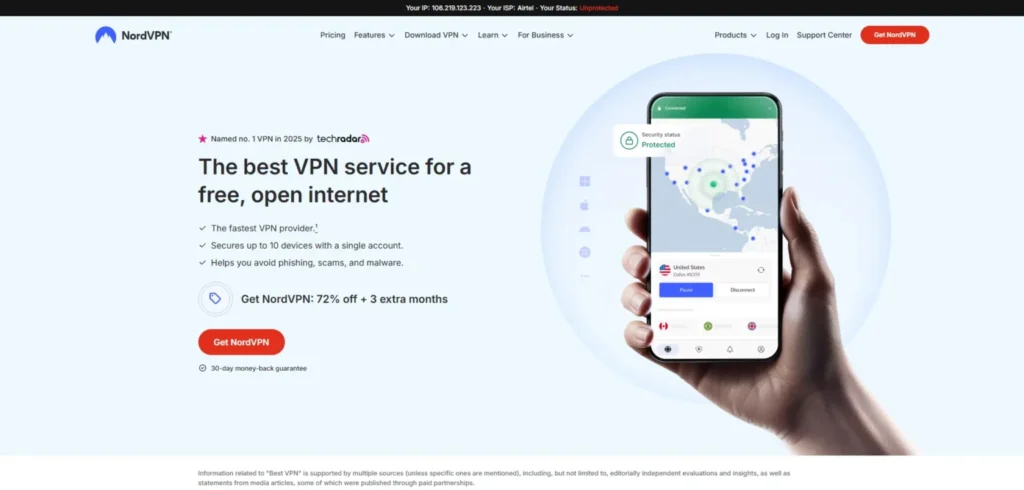
- Website: https://nordvpn.com/
- Pricing: $2.99/month
It has been common knowledge that NordVPN is the most complete Linux-compatible VPN, which has the highest speed connection rate at most stuffed desktop software program. Its own NordLynx protocol (built on WireGuard) has remained the highest performance benchmark on the Linux machines.
Linux application has dedicated security software including Threat Protection (malware, advertisements, and trackers blocker/scanner), Double VPN with multi-hop protection and experimental Meshnet to build a network that is personal and encrypted between devices. Nord VPN is based in Panama, a country without any laws limiting privacy and they have a no-logs policy that is also independently audited.
Key Features: Its key features are NordLynx Protocol, threat protection, Double VPN, Meshnet, Kill Switch, RAM-only Servers, 61 countries Servers, P2P, etc.
Pro: The ultimate speeds with full access, user-friendly Linux application, good value costs, and long success record of achieving good security audits.
Cons: User interface, despite abundant features, can become overwhelming at times when it comes to renewal of subscription whereby it is an expensive affair.
2. ExpressVPN

- Website: https://www.expressvpn.com/
- Pricing: $6.67/month
ExpressVPN is the most appropriate option since it is user-friendly and works perfectly as a VPN for Linux, making it ideal for novices. It has a simplified and easy-to-use Linux application with scorching speeds powered by its Lightway protocol. ExpressVPN also features Trusted Server Technology (RAM-only servers), and its no-logs policy has been well audited to maintain maximum privacy.
Whereas it may not be as overloaded with features as NordVPN is, it is the best at streaming and un-blocking on its server network comprising 105 countries. Linux client implementation is a good Kill Switch (Network Lock) and split tunnelling, which is good.
Key Features: TrustedServer Technology (RAM only): Proprietary Light way protocol, In 105 countries around the world, Audited no logs, Kill Switch (Network Lock), Split Tunneling.
Pros: Linux (a large part) friendly application, to an extent, immensely high and stable rates (especially on Linux), is highly reliable in streaming unblocking and customer support is 24/7.
Cons: The highest priced of the leading competitors, fewer connections simultaneously.
Also Read: VPN for Android
3. Surfshark

- Website: https://surfshark.com/
- Pricing: $2.19/month
The least expensive one that is capable of serving Linux and is also able to be of quality at the lower cost is Surfshark. Its Linux application is up-to-date and non-starchy and provides impeccable support of high-speed WireGuard protocol. The number of simultaneous connections is another unique selling point to Surfshark because it is unlimited and, therefore, perfect in the case of the house.
The desktop client will have such features as CleanWeb (ad/malware blocker) or NoBorders Mode (obfuscation). Surfshark is also vigorously audited, no-logs, and uses RAM-only servers; hence, high-grade security is provided at a level that cannot be compromised.
Key Features: unlimited simultaneous connections, WireGuard Protocol, CleanWeb (Ad/Malware blocker), MultiHop (Double VPN), NoBorders Mode (Obfuscation), RAM-only servers.
Pros: Can not be beaten on price or value, unlimited number of devices enabled, can stream flawlessly, smooth and easily handled Linux platform of the applications.
Cons: The speeds also fail to be regular at times with very far servers, the server is not so specialized as Nord VPN can be.
4. Proton VPN
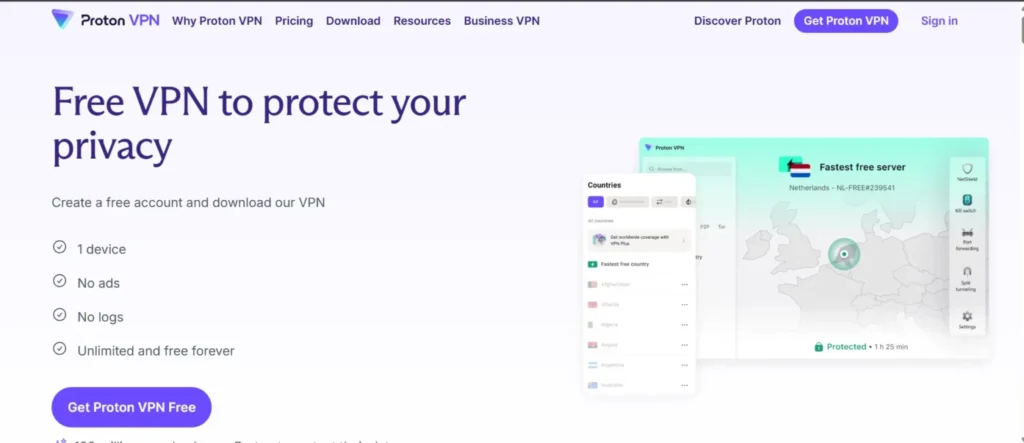
- Website: https://protonvpn.com/
- Pricing: $4.49/month
Proton VPN is regarded as the best one in the world among Linux users keen on privacy. The Linux application is created and founded in Switzerland, and focuses on open-source transparency and has subsequent audits. It also provides more like Secure Core which includes layered hopping using hardened servers in Switzerland and Iceland and Stealth protocol that is specifically developed to be used to be deeply obfuscated in order not to be detected.
Proton VPN offers the best speed using a protocol known as the WireGuard and also it boasts a free version whereby the user gets unlimited data. The Linux application is safe and it has non-invasive applications such as NetShields, which block advertisements and malwares.
Key Features: Secure Core (Multi-Hop) protocol, Stealth, Audited open-source Linux application, WireGuard protocol, NetShield (ad/malware blocker) Free unlimited data tier.
Pros: First and foremost in security functions and jurisdiction, transparent verified open source, excellent free tier with no data caps, high regard to privacy.
Cons: It is very costly compared to other alternatives, a little less efficient at breaking certain streaming sites.
5. Private Internet Access (PIA)

- Website: https://www.privateinternetaccess.com/
- Pricing: $2.03/month
PIA has been best fit among high-end and torrenting masters who appreciate customization and transparency, and thus, it is the most appropriate VPN for Linux. The Linux application is easily customizable, as one can customize it by changing such settings as the encryption enforced (AES-128 or AES-256) and connection ports.
PIA uses the high-speed protocol WireGuard and has it has been confirmed that it has a no-log policy, which has been legalized in court so that it is actually secure even being located in the US. It provides unlimited simultaneous connections and has one of the largest server networks and therefore makes it a secure and economic option to high traffic and safe P2P activities.
Key Features: Endless connections, extremely customizable, WireGuard protocol, MACE (ad/malware blocker), Proven no-logs policy, Open-source applications.
Pros: Highly customizable Linux application, very cheap at long-term prices, supports P2P networking, has an established history in regard to privacy.
Cons: Windows application interface may be old-fashioned and confusing, not necessarily as fast as NordVPN.
6. CyberGhost

- Website: https://www.cyberghostvpn.com/
- Pricing: $2.19/month
CyberGhost is famed because of the most user friendly Linux software, particularly in media consumption. It has an enormous resource of more than 11,000 servers in 100 countries, among them specialized streaming servers (Netflix and BBC iPlayer) and torrenting.
The Linux application is user friendly and has a seamless experience via superfast protocol called WireGuard. CyberGhost is located in Romania that has the privacy-friendly legal surrounding and provides the 45 days money-back guarantee, so it serves the needs of Linux users with low requirements or large amounts of used media.
Key Features: Netflix services more than 11,000 servers in 100 countries, streaming/P2P optimized servers, a wireguard protocol, audited no-logs policy, Linux app easy to use, a 45-day no-hassle money-back guarantee.
Pros: Makes use of the largest network of servers, ideal streaming experience with dedicated servers, money-back guarantee is the longest, and it has a high level of user-friendliness.
Cons: Not ideal in getting around deep listings, speeds might differ between long-distance, non-optimized servers.
7. IPVanish
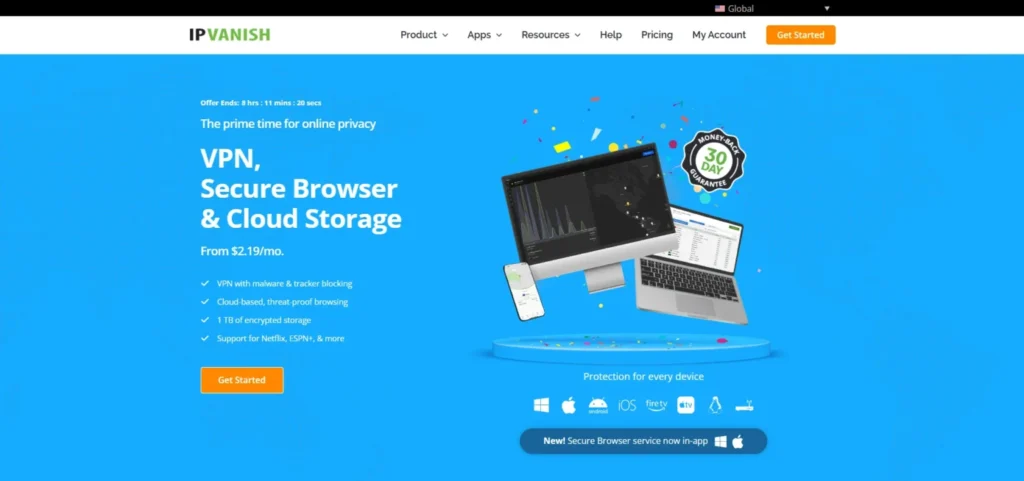
- Website: https://www.ipvanish.com/
- Pricing: $3.33/month
IPVanish is very good in the Linux customers who are concerned about speed and control of their networks. It has been tested to support the WireGuard protocol, which is fast, and to give an unlimited simultaneous connection like Surfshark and PIA. The server network owned by IPVanish is physical and private, which provides the company with a tight rein and control of the performance and security.
The Linux application, though aesthetically outdated, is useful and provides such features as traffic obfuscation. IPVanish is a good and consistent product to use by a family that requires a wide range of coverage and also binge on P2P actions.
Key Features: Infinite parallel connections, Server network owned and managed by the business, WireGuard protocol, Verified no-logs policy, Traffic obfuscation.
Pros: Unlimited protection of devices, full control over the performance of the devices, excellent P2P features, checked no-logs policy.
Cons: Linux application design is old-fashioned in comparison with the competitors, particularly with the ones in 5/9/14 Eyes jurisdictions.
Also Read: Browsers with Built-in VPN
8. VyprVPN
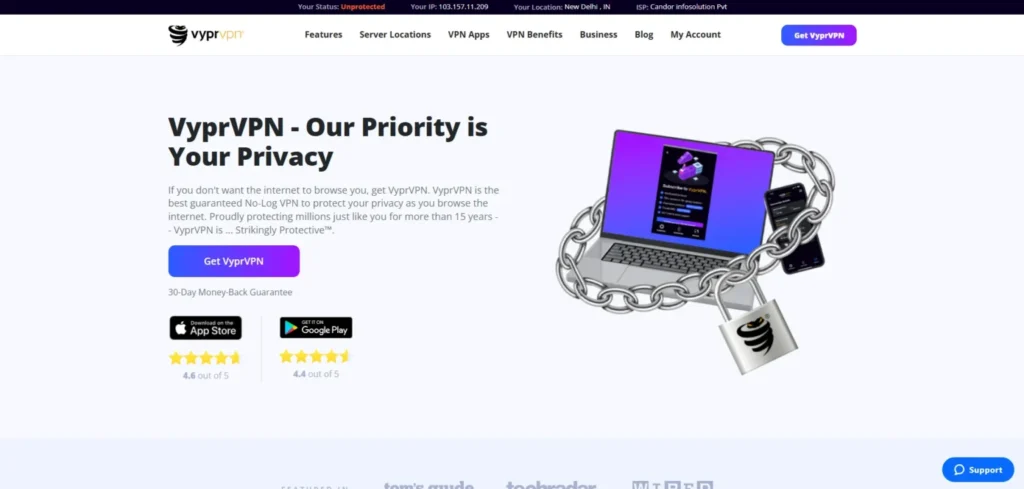
- Website: https://www.vyprvpn.com/
- Pricing: $5.00/month
VyprVPN is a highly reliable VPN for Linux, preferred by users who visit highly restricted areas most of the time. It performs best with its proprietary Chameleon™ protocol, specially configured to overcome Deep Packet Inspection (DPI) barriers such as the Great Firewall of China.
VyprVPN has all its servers in Switzerland and independently audited no-logs policy. Linux application is robust with a convenient access to Chameleon protocol with a robust security foundation, making it the most reliable to access blocked sites.
Key Features: Proprietary Chameleontm protocol (DPI Bypass), Own an entire server, Includes audited no-logs policy, Swiss jurisdiction, 10 simultaneous connections.
Pros: Advanced system of overcoming firewalls and censorship, high jurisdiction of privacy, full ownership of the network infrastructure.
Cons: Small number of servers, higher price than average monthly, not based on WireGuard (uses proprietary protocols).
9. PrivateVPN
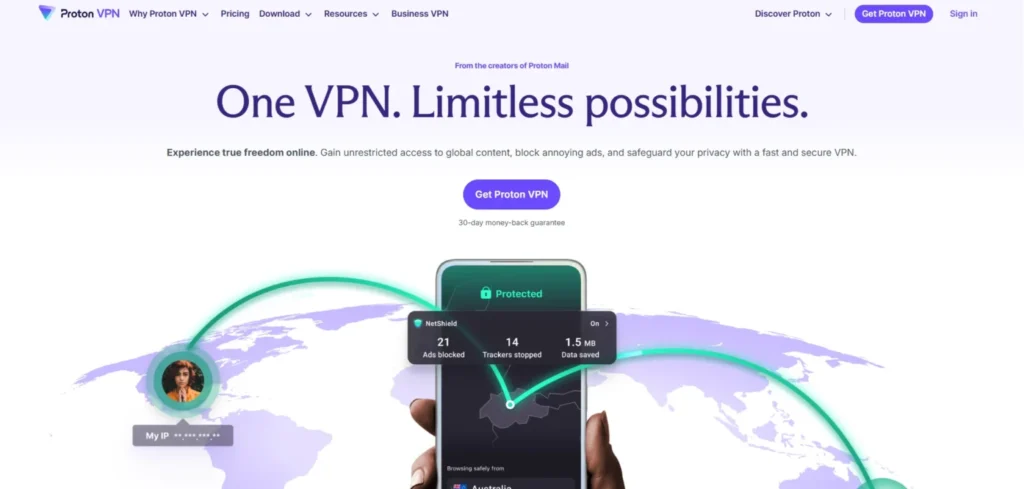
- Website: https://privatevpn.com/
- Pricing: $2.00/month
The pricing of PrivateVPN is also comparatively low and its performance is powerful in unblocking streaming services in Linux. It has a smaller network however it does very well in reaching popular platforms like Netflix and BBC.
The Linux application has a sophisticated Stealth analogue of the simple obfuscation and numerous protocols. The use of PrivateVPN is also a cheap line of defense to users whose main goal is accessing the content of regions that the platform does not allow them to do with their Linux systems.
Key Features: Excellent streaming unlocking, StealthVPN capability, Offensive to significant protocols, Kill Switch, Inexpensive long term packages.
Pros: Works with streaming services that are not blocked, highly inexpensive, convenient Linux app.
Cons: smaller server network (Less than 200 servers), less amenable to third-party security audits.
10. Mullvad VPN
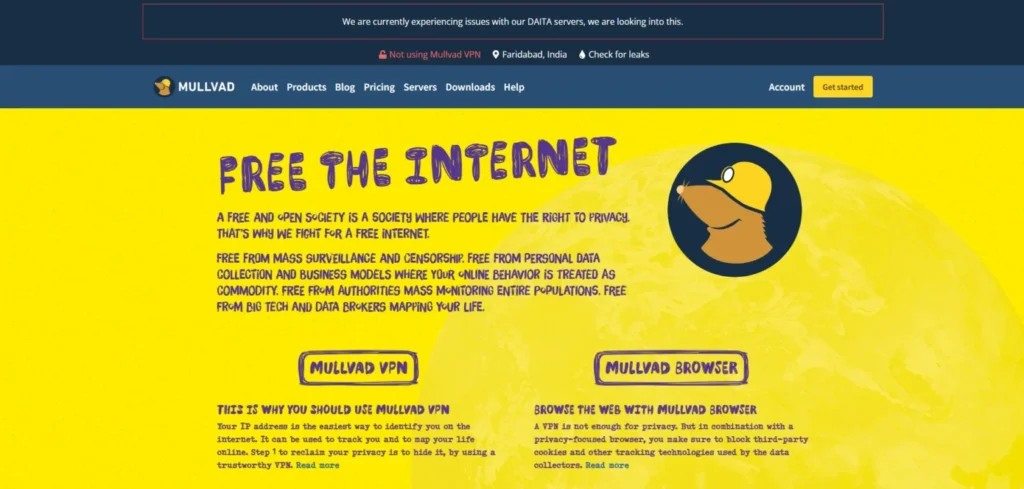
- Website: https://mullvad.net/en/
- Pricing: $5.40/month
The last privacy solution on Linux is Mullvad VPN that only comes with anonymity of the users. It provides another method of registering without the email and payment in cash or credit through the account number generated. Mullvad has a robust, slender Linux graphical interface that traverses WireGuard and operates servers using a single-view memory. Its fixed, unclear pricing and its commitment to open-source software fit very well with privacy-maximalist thought. Though it is not considered to be the fastest streaming service it features unmatched anonymity and security.
Key Features: the ability to create anonymous accounts (no email) Built-in RAM-only servers, WireGuard Protocol, No-logs audited policy, Pricing – Fixed per month.
Pros: The unparalleled anonymity and safety levels, high levels of transparency, outstanding functioning of WireGuard, and the absence of the long-term contract.
Cons: More costly to use monthly, low functionality, less reliable streaming/geo-unblocking.
11. Torguard

- Website: https://torguard.net/
- Pricing: $4.99/month
Torguard is a more customizable VPN that has a great emphasis on P2P/torrenting and an enormous number of configuration possibilities, among aged Linux users. It has a strong native client, which supports the high-speed WireGuard protocol and has such advanced key features as Stealth VPN to enable obfuscation and well configurable SOCKS5/HTTP/SSL proxying.
Dedicated IP addresses are also available on Torguard and which may be convenient in remote access of Linux. Though the interface is a bit more complicated, there is no match above the amount of control over the type of security and connection.
Key Features: Easy to configure client, Stealth VPN (obfuscation), WireGuard Protocol, Dedicated IP, SOCKS5, HTTP, and SSL proxy, Strong P2P.
Pros: Good customization ability, top performance with P2P/torrenting, with a broad protocol compatibility, good price with long term plans.
Cons: The interface is not as user-friendly as NordVPN or Surfshark in the hands of new users, and is not as popular in the streaming unblocking arena.
12. Hide.me

- Website: https://hide.me/en/
- Pricing: $2.69/month
Hide.Me is one of the strong and privacy-oriented competitors that have its headquarters in privacy-friendly Malaysia. Its VPN for Linux application has a high degree of reliability and can be integrated with the fast protocol of WireGuard. Another potentially worth trying free alternative is Hide.me, which offers 10GB of data in the free version.
Such features as advanced stealth options and dynamic port forwarding (helpful during torrenting) are offered by the subscription service. Hide.me is verified and highly transparent, to the Linux users who are more concerned with verifiable security.
Key Features: 10GB free, wireguard Protocol, Audited no-logs policy, dynamic Port Forwarding, Strong Kill Switch.
Pros: It has audited privacy policy, good level of free to play with, powerful principle of torrenting, conducive to privacy jurisdiction.
Cons: The free tier has a limit on the amount of data that can be sent, the overall amount of servers is also less than the market leaders.
13. Windscribe

- Website: https://windscribe.com/
- Pricing: $5.75/month
The next VPN is Windscribe, a particular Linux VPN which is distinguished by its consideration of such aspects as customization and ad-blocking. Linux client is fed with R.O.B.E.R.T. (strong, R.O.B.E.R.T. is a powerful DNS-based advertisement, malware blocker, tracker blocker) and Stealth protocol which is an obfuscation protocol.
Windscribe as well has a high 10GB free and unlimited-connection plan through its premium subscription. Its security functions and transparency makes it an excellent choice that the users of Linux must use to be able to regain their privacy during their browsing efforts.
Key Features: Infinite parallel connections, R.O.B.E.R.T. (Ad/Malware Blocker), Stealth protocol (obfuscation), Generous 10GB free plan.
Pros: excellent ad/malware block dashboard, free trial very generous, great at obfuscation making good customizations.
Cons: Paid year is relatively expensive, and the headquarters is placed in one of the 5/9/14 Eyes countries (Canada).
14. IVPN
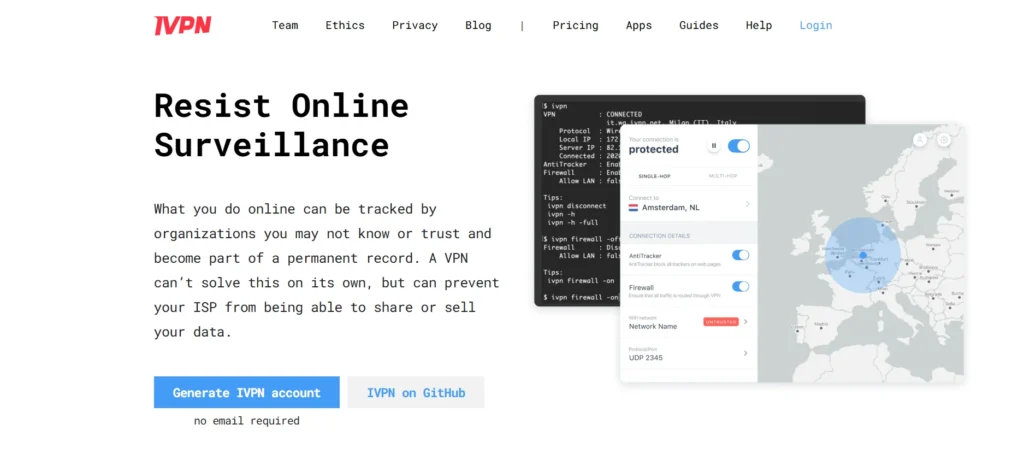
- Website: https://www.ivpn.net/
- Pricing: $6.00/month
The security experts cherish a high degree of transparency in IVPN and the degree of privacy devotion. IVPN is based in Gibraltar and has a strictly audited no-logs policy, and self-operates. It has a Linux app that is characterized by its advanced Multi-hop with the name that is Anti-Tracker and its own Hardened Mode, which allows the creation of the most secure settings possible and monitors trackers at work.
IVPN uses the WireGuard protocol and is especially attractive to those who are more interested in open-source validation, extensive control over their connections, and protection based on strong anti-surveillance activities.
Key Features: Multi-Hop (Anti-Tracker), Hardened mode (Maximum Security), Audited no-logs policy, WireGuard Protocol, Open-source applications, Multi-user unique account system.
Pros: Outstanding transparency and adherence to open-source, good security features and Anti-Tracker tool, fast performance with WireGuard.
Cons: Expensive; less server network; the interface is highly minimalist.
15. PureVPN

- Website: https://www.purevpn.com/
- Pricing: $1.96/month
PureVPN has one of the best long-term deals when it comes to VPN for Linux users, offering high-footprint performance at an entry-level price. It has a huge system of more than 6,500 servers and provides support for the WireGuard protocol. PureVPN has made remarkable progress in being more transparent with an independent audit policy of no-logs.
Its major selling points are its inexpensive nature, massive global coverage and dependable usage, which makes it a good, low-budget option among Linux users that are in need of a high number of servers to geo-unblock and offer a stable universal access.
Key Features: Long-term plans are extremely inexpensive, 6,500 or more servers in 78 countries, WireGuard Protocol, No-logs policy and fully audited, Split Tunneling.
Pros: Extremely cheap when used on long term plans, expansive server network assures geographic coverage and is also audited independently.
Cons: Some servers have inconsistent speeds, the app interface is not as user-friendly as competitors are.
The Linux VPN Comparison Table (2025)
| VPN Provider | Lowest Monthly Price (Approx.) | Key Protocol | Simultaneous Connections | Audited No-Logs Policy | Obfuscation Feature | Best For |
| 1. NordVPN | $2.99 | NordLynx | 10 | Yes | Obfuscated Servers | Best All-Around Features |
| 2. ExpressVPN | $6.67 | Lightway | 8 | Yes | Automatic Stealth | Speed & Ease of Use |
| 3. Surfshark | $2.19 | WireGuard | Unlimited | Yes | NoBorders Mode | Best Value / Unlimited Devices |
| 4. Proton VPN | $4.49 | WireGuard | 10 | Yes | Stealth Protocol | Ultimate Privacy & Security |
| 5. Private Internet Access (PIA) | $2.03 | WireGuard | Unlimited | Yes | MACE / Proxy | Power Users / Customization |
| 6. CyberGhost | $2.19 | WireGuard | 7 | Yes | Traffic Shaping | Streaming & Large Network |
| 7. IPVanish | $3.33 | WireGuard | Unlimited | Yes | Traffic Obfuscation | Owned Network / Unlimited Devices |
| 8. VyprVPN | $5.00 | Chameleon™ | 10 | Yes | Chameleon Protocol | Censorship Bypass |
| 9. PrivateVPN | $2.00 | OpenVPN | 10 | No | Stealth VPN | Budget Streaming |
| 10. Mullvad VPN | $5.40 | WireGuard | 5 | Yes | Bridge Mode | Anonymity & Security |
| 11. Atlas VPN | $1.70 | WireGuard | Unlimited | No | SafeSwap | Lowest Cost / Unlimited Devices |
| 12. Hide.me | $2.69 | WireGuard | 10 | Yes | Stealth Mode | Free Tier / Transparency |
| 13. Windscribe | $5.75 | WireGuard | Unlimited | No | R.O.B.E.R.T. / Stealth | Ad Blocking / Feature Rich |
| 14. IVPN | $6.00 | WireGuard | 5 | Yes | Hardened Mode | Extreme Transparency / Security Control |
| 15. PureVPN | $1.96 | WireGuard | 10 | Yes | Obfuscation | Lowest Long-Term Price |
Conclusion
The Linux VPN market has reached maturity. Users no longer have to depend on heavy-weight manual configurations and hacky connections. The current VPN for Linux market now offers strong, audited solutions specifically shaped and optimized for the platform.
It is a matter of usability (GUI) versus anonymity (audited code):
- To the User whom we recommend to have a GUI: NordVPN, Surfshark, and Proton VPN are the best options as they offer the convenience of a graphical interface without compromising security.
- To the CLI/Anonymity Maximalist: Mullvad VPN is the best in the way of the best privacy due to the anonymous registration and only RAM servers, but ExpressVPN is the best in the world of high speed and reliability due to its highly optimized CLI.
The Linux user can experience the full performance and control of their operating system and be satisfied with a secure VPN tunnel by choosing a provider that enables the modern Hero Kansas as an operating system with the help of the WireGuard protocol and statements that the provider will be transparent to users whether the open-source code or independent audit.
Frequently Asked Questions (FAQs)
1. What can be the Difference Between Linux CLI and GUI VPN Client?
CLI (Command Line Interface) client is facilitated in the terminal entirely and the user needs to enter commands to connect, disconnect and switch servers. It is lightweight and fast. The GUI (Graphical User Interface) client provides a more visual application, in a notable simplistic way to beginners, and is the more preferable way of showing the connection visually.
2. What is so Significant about the use of WireGuard among Linux Users?
WireGuard is a new protocol which is fast and efficient having a small codebase. In the case of Linux, where a fast and reliable connection is favored in many instances, the older and resource-consuming OpenVPN protocol is not as desirable as WireGuard is since the latter offers greater speed and consistency.
3. Can only Linux Experts use these VPNs?
No, if you choose a GUI client. Applications such as NordVPN and Surfshark provide graphical user interfaces making connection as simple as the push of a button and do not require any interaction with the command line to perform any form of basic operation.
4. Why is the VPN Installed Open-Source Linux a Plus Point?
An open-source code enables security professionals and the community at large to scrutinize the code used in application to identify vulnerabilities, backdoors, or other form of logging. This degree of openness matches the principles of Linux philosophy and gives a greater level of trust and verification.
5. Which are the Typical Linux Downloads on Which these VPNs are Based?
The most popular distributions most of the major providers support are based on Debian or Red Hat e.g. Ubuntu, Debian, Fedora, Arch, Linux Mint. Preserving the support of a particular package (DEB or RPM) can always be checked on the provider site.



